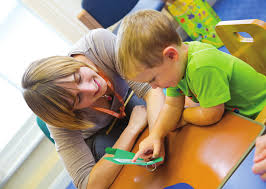All children are different. Some develop skills quickly and others may take longer. It is important to remember children start to understand words before they can say them.
Seek help if you see any of the following:
If your newborn does not:
- respond to sudden loud noises
- turn their head towards the sound
- make any sounds
By 12 months of age if your child does not:
- turn their head to soft sounds
- try to communicate with you in a number of ways using sounds, hand gestures, eye contact, and/or words, particularly when needing help or wanting something
By 3 years old, if your child does not:
- understand simple instructions/questions e.g. where's daddy?
- say about 50 words
- clearly say more than half their words
- use their words and gestures to try and interact with you e.g. waving to say goodbye.
- use the right words at the right time e.g. not be able to link what they are saying with what is actually happening at the time
- combine 2 or more words together e.g. more drink
- point to objects to share their interest with others by 2 years of age
By 5 years old, if your child does not:
- combine words to make longer sentences
- understand longer instructions e.g. pick up your cup and put it in the the sink
- speak clearly enough to be understood by most people
- use words as expected e.g. they have repetitive speech
- use words but uses gestures to get what they want, for example takes and guides you to an object they want
You should be concerned at any age if your child stops doing what they were previously able to do so.




 able to
able to